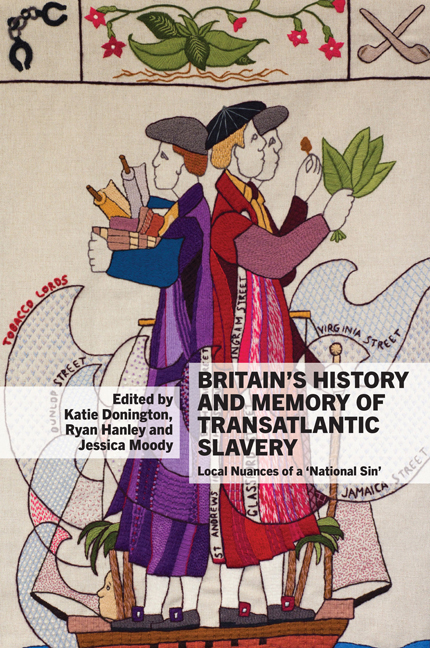Book contents
- Frontmatter
- Contents
- List of Illustrations
- Acknowledgements
- Contributors
- Introduction
- I Little Britain's History of Slavery
- 1 From Guinea to Guernsey and Cornwall to the Caribbean: Recovering the History of Slavery in the Western English Channel
- 2 ‘There to sing the song of Moses’: John Jea's Methodism and Working-Class Attitudes to Slavery in Liverpool and Portsmouth, 1801–1817
- 3 Portrait of a Slave-Trading Family: The Staniforths of Liverpool
- 4 Forgotten Women: Anna Eliza Elletson and Absentee Slave Ownership
- 5 East Meets West: Exploring the Connections between Britain, the Caribbean and the East India Company, c. 1757–1857
- II Little Britain's Memory of Slavery
- Afterword
- Selected Bibliography
- Index
- Plate section
5 - East Meets West: Exploring the Connections between Britain, the Caribbean and the East India Company, c. 1757–1857
from I - Little Britain's History of Slavery
- Frontmatter
- Contents
- List of Illustrations
- Acknowledgements
- Contributors
- Introduction
- I Little Britain's History of Slavery
- 1 From Guinea to Guernsey and Cornwall to the Caribbean: Recovering the History of Slavery in the Western English Channel
- 2 ‘There to sing the song of Moses’: John Jea's Methodism and Working-Class Attitudes to Slavery in Liverpool and Portsmouth, 1801–1817
- 3 Portrait of a Slave-Trading Family: The Staniforths of Liverpool
- 4 Forgotten Women: Anna Eliza Elletson and Absentee Slave Ownership
- 5 East Meets West: Exploring the Connections between Britain, the Caribbean and the East India Company, c. 1757–1857
- II Little Britain's Memory of Slavery
- Afterword
- Selected Bibliography
- Index
- Plate section
Summary
‘certain families serve India generation after generation, as dolphins follow in line across the open sea.’
Rudyard Kipling, The Tomb of His Ancestors(1897)On 16 June 1836 in Cawnpore, Cornet Matthew Lushington of the East India Company (EIC) Army's 7th Regiment of Light Cavalry faced a court martial on three charges of ‘conduct unbecoming of the character of an officer and prejudicial to military discipline.’ Lushington's pedigree – he hailed from one of the EIC's most prominent families – provided no protection; he was found guilty on all counts and dismissed in disgrace from the Company's service. Originally from Kent, by the late eighteenth century the Lushingtons were a family of global reach. Matthew's grandfather, Sir Stephen Lushington, had been an EIC official, Chairman and MP; three great-uncles, one uncle, three brothers and over 30 cousins had served across all branches of the EIC from the 1750s onwards. Several held shares in the Company, deploying their patronage to advance younger relatives. Such was the family's standing in the history of British India that in 1933 genealogist of the Raj V.C.P. Hodson celebrated their status as one of the foremost Anglo-Indian dynasties, for whom Matthew was presumably just one unfortunate blunder.
Yet this narrative glosses misleadingly over the family's rapacious involvement in a very different sphere of empire. On returning from India in the 1770s Sir Stephen Lushington became a partner in the London banking house of his father-in-law, John Boldero. Boldero & Lushington built a global investment portfolio embedded in the provision of mortgages for West Indian planters. Sir Stephen's eldest son and Matthew's father, Sir Henry Lushington, did not progress to India but instead entered the banking house, where he continued to expand the firm's West Indian investments. In 1799 he married Frances Maria Lewis, daughter of Matthew Lewis of Jamaica and sister of the writer Matthew ‘Monk’ Lewis, from whom she inherited a share in Cornwall and Hordley plantations in 1818. It was to Jamaica that Matthew Lushington was despatched having departed India in shame and there that he died three years later.
- Type
- Chapter
- Information
- Britain's History and Memory of Transatlantic SlaveryLocal Nuances of a 'National Sin', pp. 102 - 126Publisher: Liverpool University PressPrint publication year: 2016



